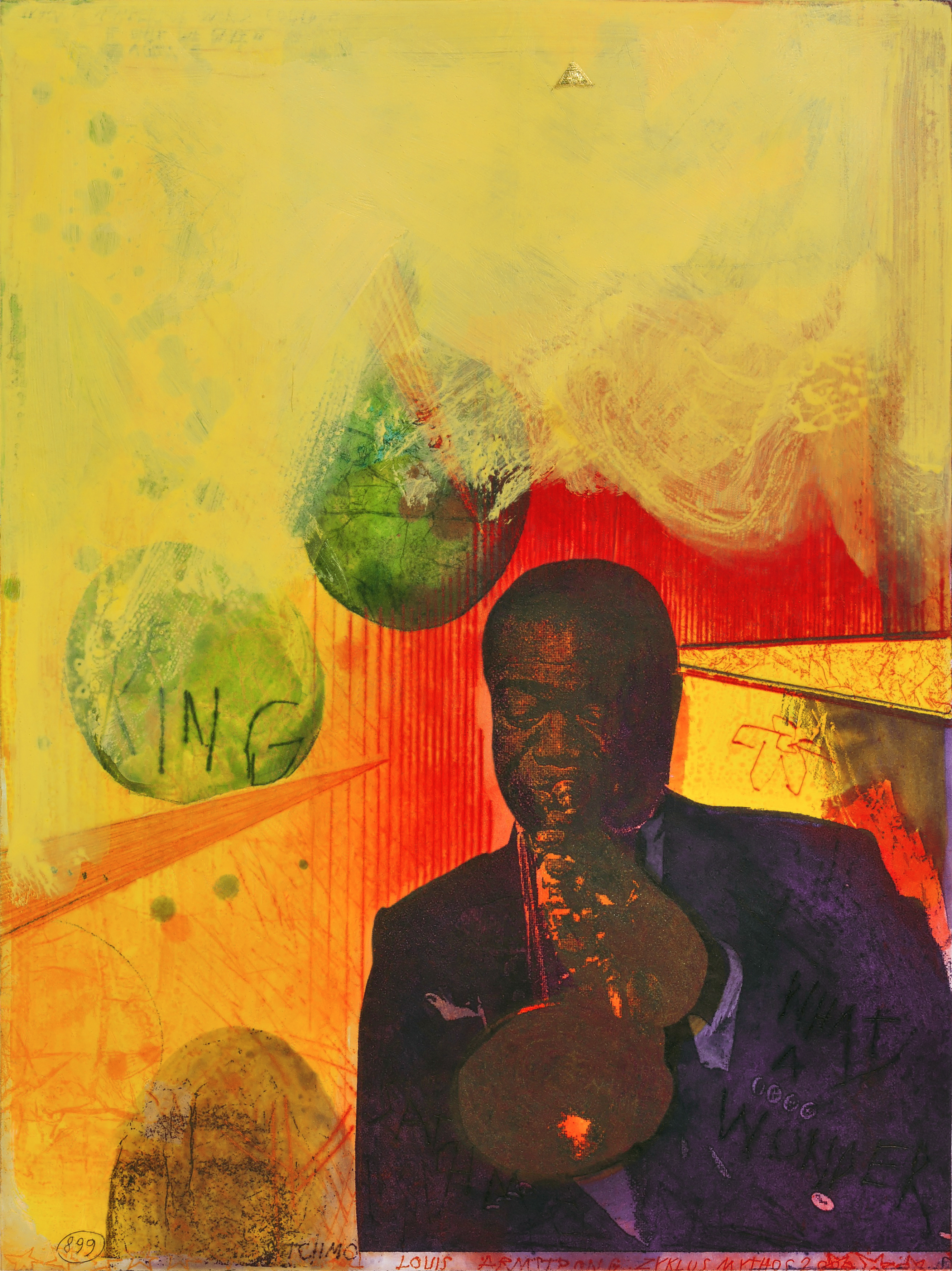
Louis Armstrong
Louis Daniel Armstrong (August 4, 1901 – July 6, 1971), nicknamed "Satchmo", "Satch", and "Pops", was an American trumpeter and vocalist. He was among the most influential figures in jazz. His career spanned five decades and several eras in the history of jazz. He received numerous accolades including the Grammy Award for Best Male Vocal Performance for Hello, Dolly! in 1965, as well as a posthumous win for the Grammy Lifetime Achievement Award in 1972, and induction into the National Rhythm & Blues Hall of Fame in 2017. Armstrong was born and raised in New Orleans. Coming to prominence in the 1920s as an inventive trumpet and cornet player, Armstrong was a foundational influence in jazz, shifting the focus of the music from collective improvisation to solo performance. Around 1922, he followed his mentor, Joe "King" Oliver, to Chicago to play in the Creole Jazz Band. He earned a reputation at "cutting contests", and his fame reached band leader Fletcher Henderson. He moved to New York City, where he became a featured and musically influential band soloist and recording artist. By the 1950s, he was a national musical icon, assisted in part, by his appearances on radio and in film and television, in addition to his concerts. His best known songs include "What a Wonderful World", "La Vie en Rose", "Hello, Dolly!", "On the Sunny Side of the Street", "Dream a Little Dream of Me", "When You're Smiling" and "When the Saints Go Marching In". He collaborated with Ella Fitzgerald producing three records together Ella and Louis (1956), Ella and Louis Again (1957), and Porgy and Bess (1959). He also appeared in films such as A Rhapsody in Black and Blue (1932), Cabin in the Sky (1943), High Society (1956), Paris Blues (1961), A Man Called Adam (1966), and Hello, Dolly! (1969). With his instantly recognizable rich, gravelly voice, Armstrong was also an influential singer and skillful improviser, bending the lyrics and melody of a song. He was also skilled at scat singing. By the end of Armstrong's life, his influence had spread to popular music in general. Armstrong was one of the first popular African-American entertainers to "cross over" to wide popularity with white (and international) audiences. He rarely publicly discussed racial issues, to the dismay of fellow African Americans, but took a well-publicized stand for desegregation in the Little Rock crisis. He was able to access the upper echelons of American society at a time when this was difficult for black men. |
Birth and Death Data: Born August 4, 1901 (New Orleans), Died July 6, 1971 (New York City)
Date Range of DAHR Recordings: 1923 - 1969
Roles Represented in DAHR: trumpet, vocalist, leader, cornet, composer, songwriter, speaker, lyricist
 = Recordings are available for online listening.
= Recordings are available for online listening.
 = Recordings were issued from this master. No recordings issued from other masters.
= Recordings were issued from this master. No recordings issued from other masters.
Recordings (Results 776-780 of 780 records)
| Company | Matrix No. | Size | First Recording Date | Title | Primary Performer | Description | Role | Audio |
|---|---|---|---|---|---|---|---|---|
| Decca | L 11192 | 10/8/1958 | I love jazz | Louis Armstrong | vocalist, instrumentalist, trumpet | |||
| Decca | L 11193 | 10/8/1958 | The Mardi Gras march | Louis Armstrong | instrumentalist, trumpet | |||
| Decca | L 11194 | 10/8/1958 | Basin Street blues | Louis Armstrong | vocalist, instrumentalist, trumpet | |||
| Decca | L 11195 | 10/8/1958 | Otchi-tchor-ni-ya-2 | Louis Armstrong | vocalist, instrumentalist, trumpet | |||
| Decca | 24034 | 5/20/1959 | Uncle Satchmo's lullaby | Louis Armstrong | instrumentalist, trumpet, vocalist |
Citation
Discography of American Historical Recordings, s.v. "Armstrong, Louis," accessed November 21, 2024, https://adpprod2.library.ucsb.edu/names/101863.
Armstrong, Louis. (2024). In Discography of American Historical Recordings. Retrieved November 21, 2024, from https://adpprod2.library.ucsb.edu/names/101863.
"Armstrong, Louis." Discography of American Historical Recordings. UC Santa Barbara Library, 2024. Web. 21 November 2024.
DAHR Persistent Identifier
External Sources
Wikipedia: Louis Armstrong
Discogs: Louis Armstrong
Allmusic: Louis Armstrong
Apple Music: Louis Armstrong
Grove: Louis Armstrong
IMSLP: Louis Armstrong
RILM: Louis Armstrong
RISM: Louis Armstrong
IMDb: Louis Armstrong
Britannica: Louis Armstrong
Linked Open Data Sources
LCNAR: Armstrong, Louis, 1901-1971 - http://id.loc.gov/authorities/names/n50001506
Wikidata: Louis Armstrong - http://www.wikidata.org/entity/Q1779
VIAF: http://viaf.org/viaf/195226
MusicBrainz: Louis Armstrong - https://musicbrainz.org/artist/eea8a864-fcda-4602-9569-38ab446decd6
Wikipedia content provided under the terms of the Creative Commons BY-SA license
Feedback
Send the Editors a message about this record.
